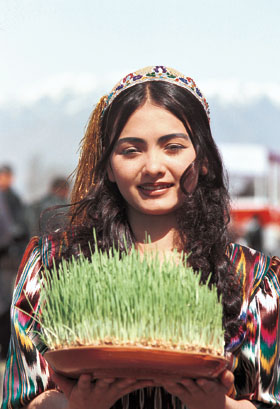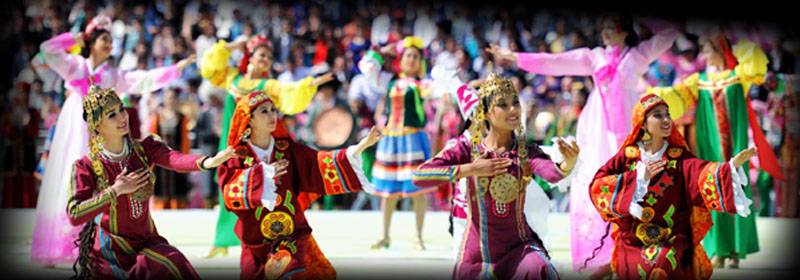Holidays. Holidays in Uzbekistan have their own history and hold particular significance for the Uzbek people. Such holidays as Navruz, Eid al-Fitr and Eid al-Adha came from the ancient times, from Zoroastrianism and Islam traditions. Independence gave Uzbekistan new holidays, symbols of a new page in the history of the country: Independence Day, Constitution Day, Day of Defenders of the Motherland, and others.
Each year Uzbekistan celebrates seven public holidays: 1st of January – New Year; 8th of March – International Women’s Day; 21st of March – Navruz; 9th of May – Memorial Day; 1st of September – Independence Day; 1st of October – Teacher’s Day; and 8th of December – Constitution Day. Two major Muslim holidays in Uzbekistan, Ramazon Hayit or Eid al-Fitr and Qurbon Hayit or Eid al-Adha are also public holidays, and are celebrated each year according to the lunar calendar.
NAVRUZ or New Day is the most ancient national holiday in Uzbekistan. Navruz was celebrated in the very distant past and has always been a folk holiday. In independent Uzbekistan, Navruz acquired a new connotation: it has become a national holiday. A few days before Navruz, people usually arrange Hashar (voluntary and joint public work), during which they clean and decorate their cities, towns and villages.
Multi-dish and sumptuous meals are the pinnacle of the holiday, which from the earliest times has been made with the hope that the year ahead will be productive and profitable. The main dish of the feast is undoubtedly the ritual Sumalak, made from sprouts of wheat grains and wheat flour. It has the consistency of a thick cream and has a pleasant distinctive taste. The dish is given as a treat to the family members, relatives, beloved ones, guests, and neighbors.
 Memorial Day. The calendar of the national holidays of Uzbekistan also has Commemoration Day, which is celebrated on May 9th. On this day, all Uzbekistan citizens who gave their lives for the freedom of their motherland, who bravely fought in World War II, who selflessly worked on the home front for the sake of victory, are commemorated.
Memorial Day. The calendar of the national holidays of Uzbekistan also has Commemoration Day, which is celebrated on May 9th. On this day, all Uzbekistan citizens who gave their lives for the freedom of their motherland, who bravely fought in World War II, who selflessly worked on the home front for the sake of victory, are commemorated.
Independence Day is the main national holiday of the Republic of Uzbekistan. This national holiday personifies all dreams and expectations of all Uzbek people, based on principles of friendliness, solidarity, charity, and mutual respect. Representatives of the various nations living in Uzbekistan, despite nationality, religion, or social status all actively celebrate a holiday in all cities, towns, and villages of Uzbekistan.
Ramazon Hayit or Eid al-Fitr marks the end of month of Ramadan, the Islamic holy month of fasting. During these days, it is a custom to commemorate the deceased, to visit and help the sick, lonely and poor.
Qurbon Hayit or Eid al-Adha is the one of the greatest holidays in Islam. It is the day when the faithful should make a gratifying oblation in accordance with their personal incomes. After the ritual praying, the faithful go on visits or receive guests at home.
Festivals. Festivals in Uzbekistan are bright, theatrical shows of historical events and national holidays. They demonstrate Uzbek culture and traditions, preserved from the past and carefully passed from generation to generation. During the festivals, there are lot of cheerful street festivities and bazaars, where you can buy interesting souvenirs made by local craftsmen. Here you will find live performances with folk songs, interesting shows of puppeteers and rope-walkers, as well as demonstrations of ancient customs, and tastings of the most famous Uzbek dishes.

Boysun Bahori. Many local or provincial celebrations take place in various parts of Uzbekistan during spring. The biggest and perhaps the most culturally significant event is the Boysun Bahori, or the Boysun Spring Festival. Held in mountainous Boysun in Surkhandarya Region, this festival dates back to pre-Islam times and features costumes, songs, dance performances, storytelling, and other local traditions which have withstood the test of time. In Boysun ritual songs and dances, performances of the Akyn narrators of folk tales and legends continue to live their natural life, not as a theatrical performance for tourists. It is here that a thousand years ago, akyn narrators composed the heroic epic Alpomish. This event is so steeped in the region’s history and culture that UNESCO has named the Boysun cultural space as a Masterpiece of the Oral and Intangible Heritage of Humanity. Every year the participants of Boysun’s Spring come from scores of countries. The festival attracts a lot of professional and amateur folklorists.
Shark Taronalari. The international world music festival Sharq Taronalari or Melodies of the East has become a very popular and prestigious event. First held in 1997 in Samarkand, the festival has attracted a growing number of performers and participants through the years. It usually takes place every summer. Folk singers who practice traditional musical genres such as uran khai (throat singing) and makom (classical, melodic Uzbek music) come to the festival to perform. The venue of the festival was not a random choice at all: Samarkand, as an ancient center of the Great Silk Road and a depositary of the cultural heritage of the Uzbeks, is of great significance not only to Central Asia, but to countries to the east and west.
Silk & Spices Festival. The four-day Silk & Spices Festival held in Bukhara in May or June is a celebration of local folk art as well as silk and spices, with lots of music and dance, plus acrobats and wrestling. Its goal is to preserve the existing cultural heritage with all its specific features and level of artistic skill, as well as to support folk crafts such as gold embroidery, hand weaving, carving, carpet weaving, building craftsmanship, fine arts.
The program of the festival includes performances of folklore ensembles from the regions of the country, national games and amusements, master classes, tasting of Uzbek pilaf at the event “Palov Sayli”, fashion show from young designers of Uzbekistan.
The atmosphere of the eastern fairy tale will always recreate the colorful procession that will bring the guests of the festival thousands of years ago, when caravans loaded with silk and spices passed from China to Europe, passing through mountain passes and lifeless deserts and stopped in blossoming oases.





